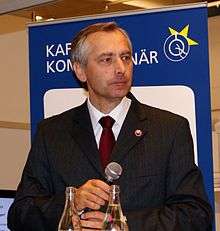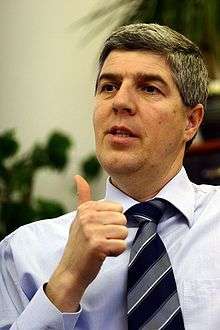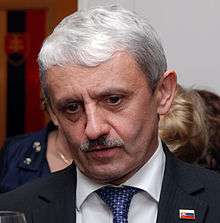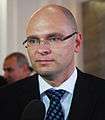2012 Slovak parliamentary election
Parliamentary elections were held in Slovakia on 10 March 2012 to elect the 150 members of the National Council. The elections followed the fall of Prime Minister Iveta Radičová's Slovak Democratic and Christian Union – Democratic Party-led coalition in October 2011 over a no confidence vote her government had lost because of its support for the European Financial Stability Fund. Amidst a major corruption scandal involving local center-right politicians, former Prime Minister Robert Fico's Direction – Social Democracy won an absolute majority of seats.
| |||||||||||||||||||||||||||||||||||||||||||||||||||||||||||||||||||||||||||||
All 150 seats in the National Council 76 seats needed for a majority | |||||||||||||||||||||||||||||||||||||||||||||||||||||||||||||||||||||||||||||
|---|---|---|---|---|---|---|---|---|---|---|---|---|---|---|---|---|---|---|---|---|---|---|---|---|---|---|---|---|---|---|---|---|---|---|---|---|---|---|---|---|---|---|---|---|---|---|---|---|---|---|---|---|---|---|---|---|---|---|---|---|---|---|---|---|---|---|---|---|---|---|---|---|---|---|---|---|---|
| Turnout | 2,596,443 (59.11%) | ||||||||||||||||||||||||||||||||||||||||||||||||||||||||||||||||||||||||||||
| |||||||||||||||||||||||||||||||||||||||||||||||||||||||||||||||||||||||||||||
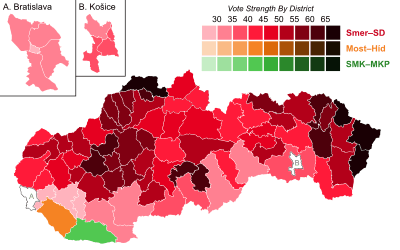 Results of the election, showing vote strength by district. | |||||||||||||||||||||||||||||||||||||||||||||||||||||||||||||||||||||||||||||
| |||||||||||||||||||||||||||||||||||||||||||||||||||||||||||||||||||||||||||||
Background
On 11 October 2011, the National Council of the Slovak Republic, the parliament of Slovakia, voted on whether to approve the expansion of the European Financial Stability Fund. As Slovakia was the last eurozone country to vote on the measure, prime minister Iveta Radičová of the Slovak Democratic and Christian Union – Democratic Party (SDKÚ) made it a vote of confidence. The motion was called on the grounds, according to the Freedom and Solidarity (SaS) party, that Slovakia, the second poorest eurozone country, should not bail out richer countries such as Greece in the interest of bank re-capitalisation. The motion then failed by 21 votes after SaS and Direction – Social Democracy (Smer–SD) abstained.[1][2]
Smer-SD then came to an agreement with the governing coalition to support the measure in what party chairman and former prime minister Robert Fico called "the most important document of this period." He also explained the first round rejection of the measure as "saying 'no' to a rightist government, but we're saying 'yes' to the rescue fund." As per the agreement between the two parties, foreign minister Mikuláš Dzurinda (SDKÚ) said that, in return for Smer's support, a snap election would be called: "We decided that as the first point of [Thursday's] parliamentary session, we will work on a proposal to shorten the voting period, with the goal of organising an election on 10 March. Immediately after [13 October or 14 October] we will debate proposals related to the EFSF."[3] On 13 October, following pressure from the European Union, which was in turn warned by the United States and China to get its finances in order, the motion was passed by a vote of 114–30 with 3 abstentions.[4]
Campaign
The number of competing political parties in the 2012 elections was the highest since the fall of communism in Slovakia in 1989. All participating parties had to register 90 days before the election and pay a fee of 16 596 euro (the fee is refunded to all parties who reach at least 2% of votes). All Slovak citizens are allowed to vote except for convicted felons in prison (only those, who were convicted for serious offenses), people declared ineligible to perform legal acts (legally insane) by court and citizens under 18 years of age.[5]
Numerous political scandals overshadowed the economic issues which led to the fall of the previous government:
- Controversial wiretapping by the Military Defense Intelligence (VOS) (The controversy is not of the wiretapping itself, but of evidence discovered during the wiretapping implicating the Governing Coalition 1998-2006 2010-2012 of major corruption)
- Gorilla scandal – a major political scandal surrounding corruption at the highest level in the government[6]
In the run-up to the elections the Gorilla scandal (secret recordings of leading politicians in 2005–2006 showing political corruption) shook the political scene.[7]
The campaign before the election was openly criticised by numerous Slovak personalities as being the first one since the fall of communism in which political programmes were completely replaced by political scandals and attacks. An open declaration condemning the campaign was signed by 16 personalities, including economist Juraj Stern, actor Milan Lasica and sociologist Martin Bútora.[8] The campaign officially started on 18 February and continued up to, and including, election day.
Opinion polls
In January 2012 it became clear that the new centre-right party, Ordinary People, might enter parliament according to polls.[9]
| Party | Last election | September 2011 | October 2011 | November 2011 | December 2011 | January 2012 | February 2012 | March 2012 |
|---|---|---|---|---|---|---|---|---|
| SMER-SD | 34.8% (62) | 43.1% (70) | 43.5% | 45.2% (79) | 43.9% (74) | 41.8% (81) | 37.3% (69) | 40% (73) |
| KDH | 8.5% (15) | 9.0% (15) | 9.7% | 9.9% (17) | 10.0% (17) | 9.3% (18) | 10.3% (19) | 12% (22) |
| Most–Híd | 8.1% (14) | 5.9% (9) | 6.9% | 7.0% (12) | 8.3% (14) | 6.4% (13) | 6.0% (11) | 7% (13) |
| SKDÚ-DS | 15.4% (28) | 12.8% (21) | 12.2% | 11.3% (20) | 10.2% (17) | 8.3% (16) | 6.1% (11) | 6% (11) |
| SaS | 12.1% (22) | 8.0% (13) | 8.2% | 5.6% (13) | 7.5% (9) | 6.4% (12) | 5.9% (11) | 6% (11) |
| OL | part of SaS list | – | – | 2.9% | 5.8% (10) | 5.2% (10) | 8.9% (16) | 5.5% (10) |
| SMK-MKP | 4.3% | 5.3% (8) | 4.2% | 3.6% | 2.8% | 3.4% | 2.4% | 5.5% (10) |
| SNS | 5.1% (9) | 8.5% (14) | 6.4% | 5.4% (9) | 5.6% (9) | 4.8% | 4.2% | 4.5% |
| 99% | - | – | – | – | – | 4.6% | 6.9% (13) | 4% |
| ĽS-HZDS | 4.3% | 3.0% | 4.7% | 2.5% | 2.1% | 1.5% | 1.8% | 1.5% |
| Others | 7.2% | 4.4% | 4.3% | 4.7% | 5.7% | 8.3% | 6.7% | |
| Source: Focus Research[10] | MVK[11] | |||||||
Conduct
The day before the election, about 1,000 protesters in Bratislava, the national capital, protested against the corruption brought to light by the Gorilla scandal, which later turned violent.
Voting took place between 7:00 and 22:00 at 5,956 polling stations.[4] The Slovak Spectator reported that former Slovak citizens who had been granted Hungarian citizenship were prevented from voting because of an amendment to the Citizenship Act in 2010 which mandated that those who acquire citizenship of another country automatically have their Slovak citizenship rescinded.[12]
Results
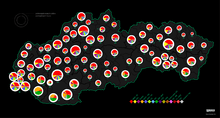
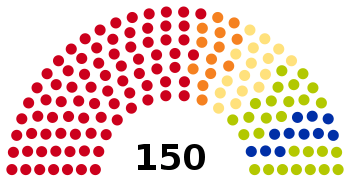 | ||||||
| Party | Votes | % | Swing | Seats | +/– | |
|---|---|---|---|---|---|---|
| Direction – Social Democracy | 1,134,280 | 44.41 | +9.62 | 83 | +21 | |
| Christian Democratic Movement | 225,361 | 8.82 | +0.30 | 16 | +1 | |
| Ordinary People and Independent Personalities | 218,537 | 8.55 | New | 16 | New | |
| Most–Híd | 176,088 | 6.89 | –1.23 | 13 | –1 | |
| Slovak Democratic and Christian Union – Democratic Party | 155,744 | 6.09 | –9.33 | 11 | –17 | |
| Freedom and Solidarity | 150,266 | 5.88 | –6.26 | 11 | –11 | |
| Slovak National Party | 116,420 | 4.55 | –0.52 | 0 | –9 | |
| Party of the Hungarian Community | 109,484 | 4.28 | –0.05 | 0 | 0 | |
| 99 Percent – Civic Voice | 40,488 | 1.58 | New | 0 | New | |
| People's Party Our Slovakia | 40,460 | 1.58 | +0.25 | 0 | 0 | |
| Change from Bottom, Democratic Union | 33,155 | 1.29 | New | 0 | New | |
| Party of Freedom of Speech - of Nora Mojsejová | 31,159 | 1.22 | New | 0 | New | |
| People's Party – Movement for a Democratic Slovakia | 23,722 | 0.93 | –3.39 | 0 | 0 | |
| Communist Party of Slovakia | 18,583 | 0.72 | –0.11 | 0 | 0 | |
| Nation and Justice - our party | 16,234 | 0.63 | New | 0 | New | |
| Green Party | 10,832 | 0.42 | New | 0 | New | |
| Law and Justice | 10,604 | 0.41 | New | 0 | New | |
| Free Forum | 8,908 | 0.34 | New | 0 | New | |
| Greens | 7,860 | 0.30 | +0.17 | 0 | 0 | |
| Our Region | 4,859 | 0.19 | New | 0 | New | |
| Party of the Democratic Left | 4,844 | 0.18 | –2.23 | 0 | 0 | |
| Ordinary People | 4,320 | 0.16 | New | 0 | New | |
| Party of Self-Employed of Slovakia | 3,963 | 0.15 | New | 0 | New | |
| Party of Citizens of Slovakia | 3,836 | 0.15 | New | 0 | New | |
| Party of Roma Union of Slovakia | 2,891 | 0.11 | New | 0 | New | |
| Party +1 Voice | 779 | 0.03 | New | 0 | New | |
| Total | 2,553,726 | 100 | – | 150 | 0 | |
| Registered voters/turnout | 4,392,451 | 59.11 | +0.28 | – | – | |
Reactions
Although Direction won an absolute majority, Fico announced on election night that he would be willing to consult with other parties if they so wished. He also said that: "The European Union can lean on Smer because we realise that Slovakia, as a small country living in Europe and wanting to live in Europe ... desires to maintain the eurozone and the euro as a strong European currency."[4] However, no other parties were willing to form coalition with Smer, leading Fico to form the first one-party government in Slovakia since 1993.
Analysis
The Economist called Fico "one of Europe's most successful centre-left politicians" after Smer-SD's win. It suggested that the "big loser" was the SDKÚ-DS' Dzurinda as a former prime minister "barely squeaked" into parliament and that, along with the SaS, were punished by voters for their failure to support the previous government's EU-backed Greek bailout. It further cited the high voter turnout (59.1) saying that Slovaks had "matured politically" for not abstaining or threatening to invalidate the poll, yet it still cited smaller protests that were "rowdy." It pointed to the OLaNO's newcomer status as "starry-eyed" in attempting to "harness voters' discontent" and that as a result of the party's showing it would be "breathing down KDH's neck." The Economist pointed out that this was the first time since the breakup of Czechoslovakia that any party had won an absolute majority, though Smer-SD fell seven seats short of the three-fifths majority needed to unilaterally amend the constitution.[13]
See also
- List of members of the National Council of Slovakia (2012–16)
References
- Cameron, Rob. "BBC News – Slovakia votes down eurozone bailout expansion plans". BBC. Retrieved 12 October 2011.
- "Slovak lawmakers reject eurozone's revamped EFSF rescue fund". Bangkok Post. Retrieved 12 October 2011.
- Hewitt, Gavin. "Slovak rivals reach deal to back EU bailout fund". BBC News. Retrieved 15 October 2011.
- "Slovakia approves expanded EU-bailout fund – Europe". Al Jazeera English. 4 October 2011. Retrieved 15 October 2011.
- National Council Elections - Ministry of Interior of the Slovak Republic
- "K.M., "Scandal in Slovakia: The multi-million euro gorilla", ''The Economist''". Economist.com. 27 January 2012. Retrieved 12 March 2012.
- Balogová, Beata; Bagin, Peter (16 January 2012), "Polls predict no clear outcome yet", The Slovak Spectator
- "Level of pre-election campaign is grim according to personalities of culture". TA3. 5 March 2012. Retrieved 10 March 2012.
- "Gorilla continues its political rampage", The Slovak Spectator, 20 January 2012
- Focus Research: 2011/09, 2011/11, 2011/12, 2012/01, 2012/02
- "ELECTION 2012: Poll: Smer on 40%; OĽaNO and SMK on course for seats". Spectator.sme.sk. 20 January 2010. Retrieved 12 March 2012.
- "Election 2012: Some Slovak voters prevented from voting by officials". The Slovak Spectator. 10 March 2012. Retrieved 12 March 2012.
- "Slovakia's election: Slovakia turns left". The Economist. 11 March 2012.
_(cropped)_2.png)
